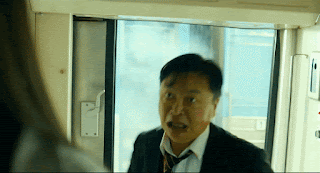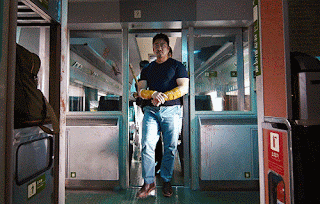South Korean Cinema is rejuvenating the zombie genre. Train to Busan Review/Discussion (Spoilers)
This is an extension to my recent blog about #Alive, it is probably worthwhile to give that a read before this one.
Train to Busan was released in 2016 and received critical acclaim from reviewers and audiences for its take on the zombie genre. It currently has a 7.6 on IMDB and an extremely impressive 94% on Rotten Tomatoes. The film was written by Park Joo-suk and directed by Yeon-Sang-ho.
Train to Busan is much more similar to World War Z than #Alive, it follows a father, trying to save his family from hoards of zombies, however while World War Z paints the main character as the only option hero, not really delving into the mindset of each character. Train to Busan follows a more troubled character, Seok-woo (Gong Yoo) who can’t save the world, but may be able to save his daughter, during the process realising what it truly means to be a father. American zombie movies seem to need one hero, without care for their psyche, you just watch thoughtlessly knowing they will complete their mission, with no true fear of them dying. Whereas Train to Busan is about his psyche, about the relationship he has with his daughter, you see throughout the film how others treat each other and you watch, not just hoping that Seok-woo and his daughter survive but that they grow their relationship in the process, again like #Alive, the zombies are not the main focus in the film, social politics and empathy are. I am going to go through the film in detail so would really advise watching the film before reading if you haven't, there are some intense emotional moments that will not be the same if you already know they occur.
As mentioned the film mainly follows Seok-woo, a business driven man who believes work just be his focus, that providing for his family financially is his main task. He is so distant from his daughter that at the start of the film he has to ask a colleague what kids are into these days, even buying her a Wii not releasing he has already previously brought the same product for her. He is under the misconception that his success at work will help his daughter, but all she wants is her dad to be around. The film shows his development as he realises his problems and puts his daughter above everything else. Seok-woo decides to get a train with his daughter played by Kim Su-an to meet her mother, and even manages to show his selfishness to his daughter on the train, telling her she shouldn't have given up her chair to a random elderly lady. On the train Seok-woo sees Sang-hwa (Ma Dong-seok) who is a caring family man who will do anything for his wife and unborn child, he is the type of man Su-an wants her father to be. He also meets Yon-suk (Eui-sung Kim), a fellow business man whose only priority is himself, he sacrifices others to save himself, screams for Seok-woo to shut the door on survivors and generally does anything he can to ensure his survival over all else. Train to Busan shows Seok-woo’s emotional transition, evolving to be less like Yon-suk and more like Sang-hwa.
After getting off the train to an apparent safe space, Seok-woo leaves his daughter in an attempt to find an alternate route, with his daughter telling him “you only care about yourself”. He soon realises his mistake when the building is overrun with zombies and he cant get back to his daughter in time, however lucky for him Sang-hwa and his wife Seong-kyeong (Jung Yu-mi) go out of their way to save Su-an and make a run for it. Seok-woo is then attacked by a zombie and to his surprise is shown empathy twice, first an unnamed homeless man blinds the zombie attacking him with a coat, and then Sang-hwa after saving his daughter holds the door open for Seok-woo to get to temporary safety. This is the beginning of Seok-woo’s evolution in character.
At this point Seok-woo, Sang-hwa and Yong-guk (Woo-sik Choi), a baseball player who is also on the train, are split up from the rest of the group, forcing them to fight their way through with any potential weapons they can find in the train. At this point Sang-hwa becomes the lead of the film, the badass who fights at the frontline to get back to his wife. Seok-woo is in the backline having been called out for being unsympathetic by Sang-hwa just beforehand he now has to watch as Sang-hwa goes beast mode putting everything on the line for his family. During all of this the greedy Yon-suk persuades everyone safe in the end carriage not to open the door for the other survivors, saying it will be a danger for them all and everyone listens to his selfish ways. It is due to this uncaring act that Sang-hwa ends up getting bitten, as he and Seok-woo are trying to keep the zombies away while Yong-guk is trying to force his way into the carriage the other survivors are hiding. It is at this point where Sang-hwa gives his final sacrifice, he sends Seok-woo to help to open the door while he single handedly holds the zombies back knowing his death is inevitable, his final words are asking Seok-woo to protect his wife and telling her what he would like their child to be named. (tears will flow at this point)
The most greedy character has caused the inevitable death of the most caring character and this is the point of Seok-woo’s full transition, he attacked the greedy businessman, no longer being anything like him, and his banished with his group to the back of the train as Yon-suk persuaded the others that they could be infected. This pointless fight with the living vs the living causes them to forget about the main zombie threat behind them, and while the selfish group argue about how to lock the others in, they fail to realise that the zombies are being let into their carriage, karma hits and the selfish become the dead. However the kingpin of this group, the most greedy of them all Yon-suk somehow survives and during his escape from the now stopped train he proceeds to directly kill multiple characters to save himself. Literally pushing people in front of him so zombies will attack them while he can run past, his selfishness has evolved to murder.

Seok-woo on the other hand is a changed man, after the homeless man sacrifices himself so that they can escape, he fights his way through to save his daughter and Seong-kyeong and they manage to reach a train that seems to be heading for safety. However Yon-suk has already reached this train, alone after sacrificing everyone he was with, but to the enjoyment of every viewer watching he is being turned into a zombie. All his selfish ways, all his sacrifices, achieved nothing, he killed many yet still died himself. Seok-woo now has to fight his former self to protect the others, even following in Sang-hwa’s footsteps and letting himself be bitten to save them. He has completed his transition and become the caring father his daughter wanted, unfortunately it took his death to do so. He says goodbye to his daughter, shows his love for her and leaves her with Seong-kyeong, he heads to the back of the train and in his final moments reminisces how happy he was when his daughter was born, his final thoughts are of love. Seong-kyeong walks with Soo-an into a tunnel, the only direction they can go and thanks to Soo-an singing her father's favourite song, they are spared by the military and saved. Train to Busan is a compelling drama/thriller delving into social politics, work/life misconceptions and human empathy, thoughtfulness and emotion comes before jump scares and CGI, it is a breath of fresh air for the zombie genre.

A sequel to Train to Busan called Peninsula has just been released in South Korea, which seems to focus on a heist mission in the world of a zombie apocalypse, again creating an interesting plot and having the zombies as a factor, but not the main point of the film. Although I have not seen it yet, I am excited as even if it's close to a Train to Busan, it will be amazing. From the few clips I have seen, it looks like a blend between Tokyo Drift and Mad Max.. but during a zombie outbreak.

Comments
Post a Comment